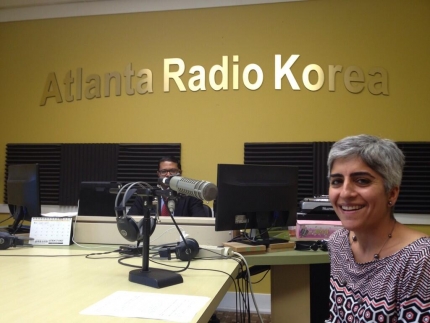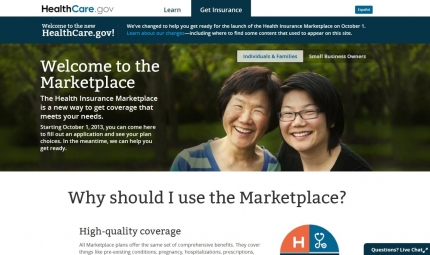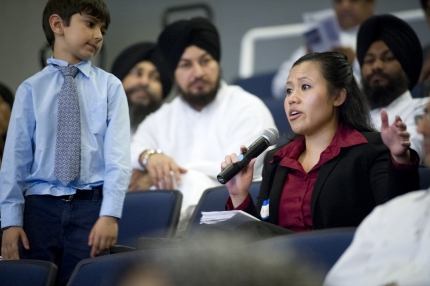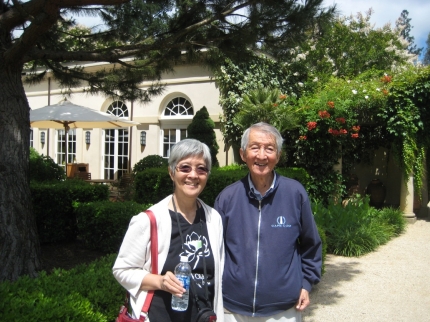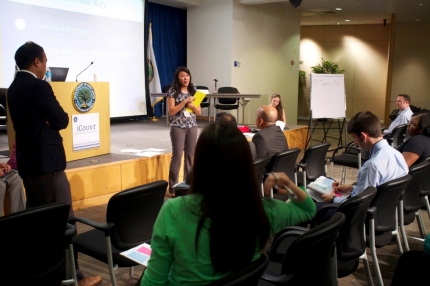Initiative on Asian Americans and Pacific Islanders Blog
Growth and Promise in Gwinnett County, Georgia
Posted by on July 11, 2013 at 4:59 PM ESTAs Executive Director of the White House Initiative on Asian Americans and Pacific Islanders, it is heartening to see progress in Asian American and Pacific Islander (AAPI) communities, and especially inspiring to see community growth and leadership in my home state of Georgia. In a recent visit to Gwinnett County, I had the opportunity to meet with elected officials and AAPI leaders to learn about Georgia’s rapidly growing AAPI population, including nearly 13% in Gwinnett County, and how public officials and community leaders have embraced the rapidly changing demographics in Georgia.
On my trip, I met with local AAPI nonprofit organizations to gain a deeper understanding of the community, and to discuss issues concerning Georgia’s AAPIs. One of these organizations - Center for Pan Asian Community Services - provides a range of social services from after school programs to health screenings within the AAPI community. I also had the opportunity to check out the famous Buford Highway that houses hundreds of AAPI businesses and restaurants, including Atlanta Radio Korea, where I chatted with the host on live radio in Korean (my comments translated simultaneously) about the Initiative’s work, commonsense immigration reform, the Affordable Care Act and student debt.
An important part of the visit was meeting with local officials, including Gwinnett county mayors and commissioners. Together, we discussed AAPI issues and concerns in Georgia, including small business growth, health care, immigration, and AAPI representation in government (Read about how fixing our broken immigration system will help our economy here). While the population growth of AAPIs is heartening, it is critically important that this level of growth be reflected in participation and representation in local and state government, and ensuring public officials are responsive to issues that impact diverse AAPI communities.
The day culminated in Building Georgia’s Asian American Future, a dinner hosted by the Georgia Asian American and Pacific Islander Task Force and many other organizations. The event brought together local community members and public officials, and highlighted how active and engaged Georgia AAPIs are becoming. There, I shared my sentiments on what I’d seen in Georgia, and my hopes for a bright future for all of us. My time in Georgia allowed me to look back at my past and reflect on AAPIs in Georgia when I was a kid, growing up in Savannah, Georgia, and to now witness a great deal of positive, inspiring change and growth. The local AAPI community and business leaders, and public officials illustrated a conviction to build on the progress being made for all Georgians, including AAPIs. What I saw assured me of all the positive things to come.
Kiran Ahuja is the Executive Director of the White House Initiative on Asian Americans and Pacific Islanders.
Learn more about Additional IssuesHealthCare.Gov Provides Tools to Help AAPIs Get Health Insurance
Posted by on July 10, 2013 at 7:55 AM ESTToo often, Asian Americans and Pacific Islanders (AAPIs) are viewed as a “model minority” group – one that is wealthy, healthy and happy. However, this misconception masks many of the challenges the AAPI community faces – including persistent disparities in health and health care. For instance, nearly one out of every five AAPIs lacks health insurance. Moreover, AAPIs, like other racial and ethnic minority groups, suffer disproportionately from chronic diseases such as hepatitis B, diabetes, heart disease and cancer. AAPIs are also the least likely among all racial groups to receive routine mammograms and pap smears.
Three years after its passage, the Affordable Care Act is proving to be a tipping point in our efforts to help address these disparities. Access to affordable health insurance coverage is one of the most important determinants of an individual’s health. Because of the health care law, AAPIs are already gaining greater access to health coverage, thanks to provisions that allow young adults to stay on their parents’ health insurance plans until age 26, and prohibit insurance companies from denying coverage to children because of a pre-existing condition, like diabetes.
And, that’s just the beginning; starting in 2014 nearly 2 million uninsured Asian Americans and Pacific Islanders will have new opportunities for coverage through the Health Insurance Marketplace. Also, increased funding to community health centers is enabling more AAPIs to receive culturally and linguistically appropriate care. Strengthened data collection standards that distinguish between AAPI subgroups will help providers and policymakers better understand the diverse needs of different groups in the AAPI community, and make more informed decisions about how best to address health disparities. These are just a few of the many ways the Affordable Care Act benefits AAPIs.
An important feature of the Affordable Care Act is the new Health Insurance Marketplace. The Marketplace will serve as a one-stop shop for individuals, families, and small businesses to search for health coverage options and apply to enroll in the plan that best fits their needs. Individuals can compare plans based on price, benefits, and other features, as well as find out if they are eligible for assistance to help pay for premiums or other programs like Medicaid and the Children’s Health Insurance Program. Enrollment in the Marketplace begins October 1, 2013 for coverage beginning in (or after) January 2014, so it’s important to get ready now to apply and enroll.
HealthCare.gov is the official website for the latest and most accurate information about the Marketplace. With resources, videos, and checklists, and a live web chat available 24/7, the website is the best resource for consumers to learn about health coverage options and enrollment now. Beginning October 1, HealthCare.gov will be the place to go to directly access the Marketplace. Consumers can also call the toll-free number now at 1-800-318-2596 to speak with a representative. The call center offers assistance 24 hours a day, 7 days per week in over 150 languages, including Bengali, Chinese, Hindi, Korean, Tagalog and Vietnamese.
Brochures, fact sheets, posters, infographics and videos (including materials in Asian languages) are also available at marketplace.cms.gov. The White House Initiative on AAPIs also provides more information on the Affordable Care Act specifically for the AAPI community. Now is the time to learn about your options, prepare for enrollment, and spread the word to your loved ones and your communities about these new opportunities for health coverage and health care.
Dr. J. Nadine Gracia is the Deputy Assistant Secretary for Minority Health and the Director of the Office of Minority Health at the U.S. Department of Health and Human Services (HHS).
Learn more about Health CareRecognizing the Extraordinary Contribution of Filipino Veterans
Posted by on July 9, 2013 at 4:22 PM ESTIn 1941, more than 260,000 Filipino soldiers responded to President Roosevelt’s call-to-arms and fought under the American flag during World War II. Many made the ultimate sacrifice as both soldiers in the U.S. Army Forces in the Far East, and as recognized guerrilla fighters during the Imperial Japanese occupation of the Philippines. Later, many of these brave individuals became proud United States citizens. However, because of the Rescission Acts of 1946, most Filipino World War II Veterans did not receive compensation on par with United States veterans for their service to the United States.
President Obama recognizes the extraordinary contribution made by Filipino veterans. The American Recovery and Reinvestment Act of 2009, which the President signed into law, included a provision creating the Filipino Veterans Equity Compensation Fund. Eligible veterans who are U.S. citizens receive a one-time payment of $15,000; eligible veterans who are not U.S. citizens receive a one-time payment of $9,000.
To date, we are pleased that over 18,000 claims have been approved. However, many Filipino Veterans still believe that their claims were improperly denied, or that they did not receive a satisfactory explanation as to why their claims were denied. To address these concerns, in October 2012, the White House Initiative on Asian Americans and Pacific Islanders, in collaboration with the Office of Management and Budget and the Domestic Policy Council, created the Filipino Veterans Equity Compensation Fund Interagency Working Group (IWG) comprised of the Department of Veterans Affairs, the Department of Defense, and the National Archives and Record Administration. The IWG was tasked with analyzing the process faced by these Filipino veterans in demonstrating eligibility for compensation in order to ensure that all applications receive thorough and fair review.
Learn more about VeteransEngaging AAPI Faith-Based and Community Leaders in Chicago
Posted by on June 20, 2013 at 11:52 AM ESTOn Saturday, June 15, the White House Initiative on Asian Americans and Pacific Islanders hosted a forum with Asian American and Pacific Islander (AAPI) faith-based and community leaders at Wilbur Wright College in Chicago, Illinois. This convening kicks off a series of similar forums across the country and was designed to connect federal officials with AAPI faith-based and other community leaders to share key Administration policies on economic growth, immigration, education, and civil rights. Ultimately, members of the Chicago community were provided an opportunity to discuss local concerns with federal and local leaders, and gained a better understanding of resources and services available to AAPI groups.
The event opened with welcoming remarks from Unmi Song, a member of the President’s Advisory Commission on Asian Americans and Pacific Islanders. Unmi outlined President Obama’s commitment to faith-based communities and reiterated the President’s message that “instead of driving us apart, our varied beliefs can bring us together.” The Chicago forum was also attended by two other members of the President’s Advisory Commission, Amardeep Singh and Sunil Puri.
Learn more aboutMy Big American Family
Posted by on June 17, 2013 at 8:07 AM ESTNearly everyone in America has an immigration story to share. Our voices are louder when we speak together, so please share your stories and highlight the work that’s being done in your communities. Together we can achieve commonsense immigration reform.
May (mei) means America (mei-guo) in Mandarin. My grandfather gave me this name because I was the first in my family to be born in America. My parents both came to the United States as students, my father from China and my mother from Hong Kong. My father arrived in America in 1939 as a 19 year old. His hard work started from day one, first as a college student, then as he worked various jobs to get by, including working for the U.S. Army during World War II.
As a child, I grew up in a suburb of Boston in a community populated with very few Asians. Our family was one of just a few Asian families in our neighborhood. Once my father and his brother were able to sponsor their siblings from Hong Kong and China, who had been separated from each other for decades, we were finally able to enjoy family gatherings with aunts, uncles and cousins. Holidays were no longer just our immediate family and we could enjoy our Asian American Thanksgiving of turkey, along with Chinese sticky rice stuffing and side dishes, with our big American family. Together, we were able to embrace the best of both worlds.
I became passionate about immigration policy through helping thousands of immigrants in the International Ladies’ Garment Workers’ Union (ILGWU) apply for citizenship, family petitions, and legalization through the 1986 legislation. Immigration laws and history have a deep impact on our families and communities. The path to citizenship and the broad inclusion of families were deeply personal and important in my life. My hope is that one day, current and future generations of immigrants can enjoy the rights and benefits of family reunification that my family was able to experience, as they strive for their own American dreams and American families.
May Y. Chen is a member of the President’s Advisory Commission on Asian Americans and Pacific Islanders. Ms. Chen is also an adjunct professor at the City University of New York.
Learn more about ImmigrationiCount: Equity Through Representation
Posted by on June 12, 2013 at 10:50 AM ESTToo often, the “big picture” masks critical characteristics of the individual parts. Such is the case with aggregate data on student achievement within the diverse, complex and multifaceted Asian American, Native Hawaiian and Pacific Islander (AAPI) student population in the U.S. To address this question—the importance of disaggregating AAPI student data to reveal disparities between individual AAPI subgroups (i.e., Asian Indians, Hmong, Cambodian, Japanese, etc.), last week the White House Initiative on Asian Americans and Pacific Islanders (WHIAAPI) partnered with the National Commission on Asian American and Pacific Islander Research in Education (CARE) to host iCount: Equity through Representation, a two-day symposium that addressed the hurdles educational institutions and community groups face to achieving data disaggregation and brainstormed best practices to implementing data disaggregation systems at those institutions.
The event featured a briefing for representatives from philanthropic organizations, panels comprised of representatives from the 40 educational institutions in attendance, and intensive breakout sessions designed to identify concrete solutions to the problem. On the same day, CARE announced the release of its report, which outlines the rationale for disaggregating data to reveal disparities among the many sub-groups. Chief of Racial Statistics at the U.S. Census Bureau, Nicholas Jones, briefed participants on key facts; i.e., that AAPIs are the most diverse ethnic group, as well as the fastest growing, in the U.S. Thus, as each AAPI sub-group is clustered together, the struggles of the more vulnerable sub-groups become masked.
Afternoon Keynote Speaker Congresswoman Judy Chu, Chair of the Congressional Asian Pacific American Caucus (CAPAC), and Congressman Mark Takano also provided remarks underscoring the importance of data disaggregation for the community. U.S. Department of Education Under Secretary Martha Kanter discussed the Department’s commitment to AAPI higher education matters, and urged educational institutions to share and promote their best practices on data disaggregation. A plethora of key national AAPI community organizations were also actively engaged in the event, representing the diverse AAPI community.
Don Yu is Special Advisor to the Secretary at the U.S. Department of Education.
Kiran Ahuja is Executive Director of the White House Initiative on Asian Americans and Pacific Islanders.
Learn more about Education
- &lsaquo previous
- …
- 27
- 28
- 29
- 30
- 31
- 32
- 33
- 34
- 35
- …
- next &rsaquo
White House Blogs
- The White House Blog
- Middle Class Task Force
- Council of Economic Advisers
- Council on Environmental Quality
- Council on Women and Girls
- Office of Intergovernmental Affairs
- Office of Management and Budget
- Office of Public Engagement
- Office of Science & Tech Policy
- Office of Urban Affairs
- Open Government
- Faith and Neighborhood Partnerships
- Social Innovation and Civic Participation
- US Trade Representative
- Office National Drug Control Policy
categories
- AIDS Policy
- Alaska
- Blueprint for an America Built to Last
- Budget
- Civil Rights
- Defense
- Disabilities
- Economy
- Education
- Energy and Environment
- Equal Pay
- Ethics
- Faith Based
- Fiscal Responsibility
- Foreign Policy
- Grab Bag
- Health Care
- Homeland Security
- Immigration
- Innovation Fellows
- Inside the White House
- Middle Class Security
- Open Government
- Poverty
- Rural
- Seniors and Social Security
- Service
- Social Innovation
- State of the Union
- Taxes
- Technology
- Urban Policy
- Veterans
- Violence Prevention
- White House Internships
- Women
- Working Families
- Additional Issues
